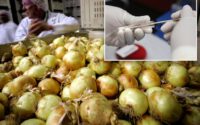Man discovers he has a hole in his heart after stroke
It was the whirlwind that professional storm chaser Scott McPartland never saw coming.
The 50-year-old Rego Park, Queens native had long led an incredibly active life, getting daring footage — and feeling no fear in the process — of the nation’s most devastating hurricanes, blizzards and tornadoes. He ate well, went to the gym and, when not on the hunt for extreme weather moments, worked as a day trader.
But, in May, the strong-as-an-ox McPartland — who pushed a minivan out of Hurricane Ida flood waters on Woodhaven Boulevard last year — suddenly had his legs give out while vacuuming his Queens home and watching the stock market fluctuate on TV.
He collapsed to the ground with no explanation in a frightening episode caught on his home security cameras.

“I first thought I was having a panic attack from watching the last 15 minutes of the market,” McPartland told The Post of the unprecedented numbing sensation he felt on the right side of his body.
Thinking quickly, McPartland — to the best he could — threw himself back up from the floor while losing control of his body.
Desperate to signal his wife, Cecelia Morgan, 49, who was working a floor below, McPartland deliberately “cascaded” himself down a flight of 22 stairs to get her attention. It’s something he has little recollection of now.
“When I got to her is when I realized I couldn’t speak,” he said. “It was the scariest moment of my life. It eclipsed any storm chasing experience I ever had.”
Morgan realized her husband of almost six years was having a stroke and called EMTs to have him rushed to LIJ Forest Hills Hospital.

“I thought I was going to die,” McPartland said. “I told Cecelia on my way into the emergency room, ‘this is it for me, I need you to be strong now.’”
But the dark clouds suddenly lifted when Dr. Rohan Arora — director of the hospital’s stroke program — not only managed to save McPartland’s life with the blood thinner tPA, but was also able to prevent any lifelong damages from the harrowing, near-death experience.
“The more quickly you get this medicine, the higher your chances are for a decent recovery and almost no lasting severity, like you’re seeing in Scott’s case,” Arora told The Post.

Still, the mystery remained, how does a healthy, comparatively young man like McPartland suddenly suffer such a severe stroke without cause?
The complex answer was found through some “detective work,” according to interventional cardiologist Dr. Avneet Singh, who began treating the storm chaser at North Shore University Hospital in Nassau County.
After running a laundry list of tests and finding no immediate cause for stroke, Singh looked inward. He discovered that McPartland was born with a literal hole in his heart — no more than a few centimeters wide — medically known as patent foramen ovale (PFO for short). Doctors believe it had facilitated blockage to a blood vessel in his brain — which was where a stroke-causing blood clot formed.


“[PFO] is a connection from the left side to the right side [of the heart] that nature created for the blood to go from left to right while inside the mother’s womb. After you’re born, you essentially don’t need it,” Singh said, explaining that these holes often close organically after birth and, even if not, are usually no cause for concern — except for very rare cases like McPartland.
Statistically speaking, McPartland was at a great risk for similar episodes unless the hole in his heart was addressed, Singh explained.
Singh was tasked with closing the small, yet life-altering gape through an outpatient catheterization procedure last August. The microscopic surgery was so efficiently executed that it only took about 30 minutes to complete.

“I was back home eating sushi with my wife at 5:30 p.m. and felt outstanding,” said McPartland. The following month, he went to Florida to hunt down Hurricane Ian and celebrate his birthday.
“It was very surreal to be doing that on my 50th birthday considering it was only four months after my stroke,” he added. “If you told me the night I was in the ambulance going to the hospital, ‘don’t worry about it, by your 50th you’ll be back doing what you love,’ I wouldn’t have believed you because I didn’t think I was going to live.”
Getting back on his feet so soon is a medical marvel of its own, McPartland’s surgeon believes.

“For him to be able to recover so quickly and get back to storm chasing, that is all from his own mental toughness,” Singh said.
Returning to action like the good old days didn’t come without a new outlook on life for the now whole-hearted McPartland.

He’s “living in the moment” more and “expressing gratitude” for everyday things — like having a huge Thanksgiving meal with his wife this holiday season.
“We’re in extra innings,” Morgan said with a grateful smile. “We even chased after Hurricane Nicole together last month in Florida.”


